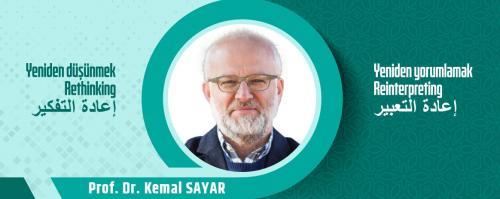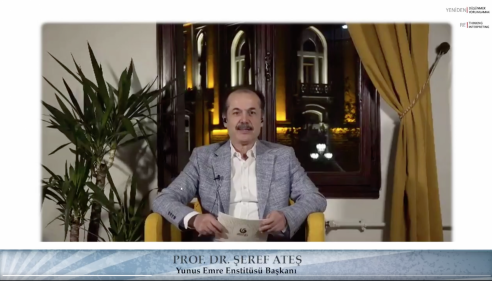"Rethinking, Reinterpreting" Program from Yunus Emre Institute
Yunus Emre Institute President Prof. Dr. Şeref Ateş has discussed the current situation around the world due to the coronavirus (Covid-19) epidemic and the world order that will emerge after it with Prof. Dr. Kemal Sayar at his program "Rethinking, Reinterpreting," broadcast at social media. The program lasted approximately 50 minutes and was aired online in English and Arabic as well.
The first guest of Yunus Emre Institute President Prof. Dr. Şeref Ateş was psychiatrist Prof. Dr. Kemal Sayar, and the guests of the coming programs will be Presidential Spokesperson İbrahim Kalın and writer Alev Alatlı.
At the beginning of the program, Yunus Emre Institute President Prof. Dr. Şeref Ateş made comments. "As you know, we are going through a difficult time. The castles, walls, fenced and mined boundaries, smart cities and technologies in those smart cities that we have been building for decades have been unable to protect us from a virus that cannot be seen with the unaided eye. So, we are puzzled. In this period, we would like to re-question our habits we have tended to see as normal so far. The most critical act in doing so for human beings is the act of thinking. Let us go on a voyage into consciousness by thinking and reinterpreting. Hence, the name of our program as 'Rethinking, Reinterpreting'. Our primary purpose in this program series is to know more about human beings, make a sense again of the relationships among human beings, and re-question the relationship between man and nature, and in doing so, uncover the truth by leaving aside the individual, national and regional interests and ambitions. We would like to question and make sense of these matters by coming together with expert scholars of science, culture and thought," he said. He asserted that he saw the emerging situation as radical uncertainty.
"The entire world is facing a new situation. What should individuals, society or humanity do? How should we interpret this situation?" was Yunus Emre Institute President Prof. Dr. Şeref Ateş's first question. In response, Prof. Dr. Kemal Sayar said: "An epidemic that was unparalleled during the last 100 years has hit our world like a meteor. It put us all in the same destiny. The streets are now reminiscent of doomsday. People feel a great insecurity and eeriness. It was such a thing that it affects everyone including kings, prime ministers and celebrities. It has clearly created a global atmosphere of unrest. I see the emerging situation as radical uncertainty. Our power to make predictions has been virtually reset." Sayar underlined that it was very likely for us not to be able to return to the old normal and new habits would be acquired in a new age.
"If we collect all viruses around the world, they would weigh 3-4 grams. Such a tiny microorganism brings the entire world into line. Here, we realize that all those modern structures we have built are actually so feeble that they can be destroyed with a single blow." Prof. Dr. Kemal Sayar maintained that it is improper for man to be prideful.
"We thought we were the master of the university; we thought we were the master of all beings and our destiny; we thought we can torment everyone with this. We were indifferent to the sorrows, refugee crisis, and displacement crisis of others. What has happened now? As the entire humanity, we feel a great threat. It was for this conceit, disproportionate reigning of the nature that zoonotic viruses could spread at such an immense rate. We have to establish the correct causal relationship. It is wrong to say that this virus has wreaked havoc; rather, we are facing with a disaster created at the hands of human beings. We have to think careful about our responsibility in this. We have to switch to a paradigm in which people serve as homelands, shelters and remedies to each other. Every human being is responsible for taking care of others. We will get rid of this calamity with this paradigm of cooperation," he said.
Prof. Dr. Kemal Sayar asserted that the ongoing epidemic around the world has shown the age of anxiety to humankind. "The spirit of the times is, in my opinion, that human beings must abandon their claim to godhood with their deeds. They have to share the world with other beings on equal terms and act with modesty. They have to abandon the egoistic system and stop bringing their egos to the fore and dispense with egocentric behaviors and they have to transition to a solidarity-based and cooperative system. The spirit of the times urges us to exhibit the courage to being, which can positively alleviate anxiety. Otherwise, it is very difficult to cope with this anxiety; the very assumption that the future is full of adversities will paralyze human beings. Less anxiety is good; excessive anxiety is bod. Excessive anxiety prevents us from assuming our responsibilities regarding life. A small portion of anxiety will urge us to take proper measures and make due changes to our lives," he said.
Prof. Dr. Kemal Sayar indicated that the spirit of the times should be redefined as the spirit of solidarity and responsibility. When asked which freedom would bring happiness, he said:
"The first thing we should do is not to lay our souls as pawns. How could we lay our souls as pawns? We lay our souls as pawns when we make them the slaves of our ambitions and greed. Human beings cannot be isolated with solitary confinement because they have the faculty of imagining. Unlike all other beings, human beings have the ability to imagine. As such, man can cope with all sorts of prisons. It is very easy to overcome the isolation. We should not be complaining about isolation. Isolation can be bliss. Many people cannot have it. We should try to make the best of this time as an extended now or a perpetual moment by sharpening our imagination, sorting out our plans regarding the future, diversifying our time, and delve into the abysses inside us."
During the program, the questions from abroad were also answered.
For programme;
https://www.pscp.tv/w/1jMJgQQnbyPKL?t=4406 (Turkish)
https://www.pscp.tv/w/1vOxwooBwboxB?t=688 (English)
https://www.pscp.tv/w/1ZkJzLLoZEeKv?t=2. (Arabic)






